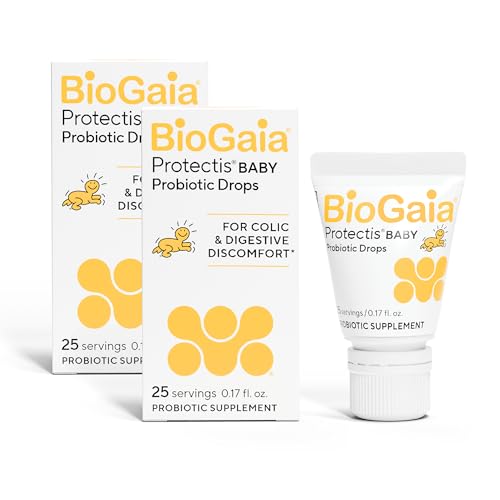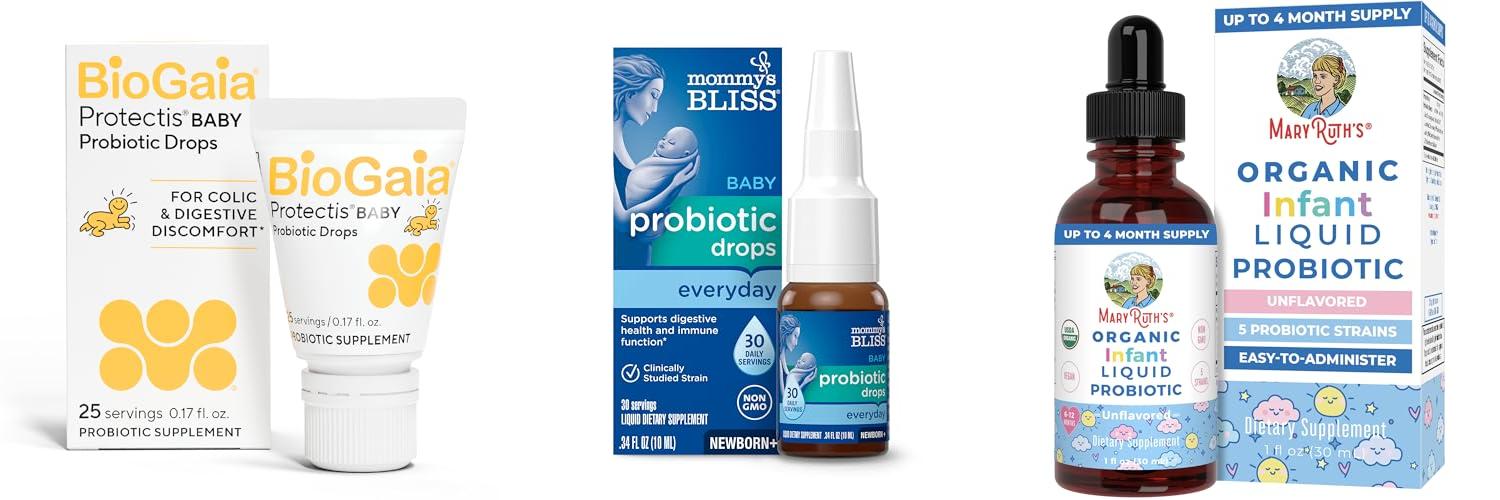Is your little one experiencing tummy troubles, like gas, fussiness, or irregular poops? You’re not alone. Many parents worry about their baby’s digestive health and wonder if a probiotic might help. It’s a common concern, but navigating the world of baby probiotics can feel like a puzzle. So many brands, so many ingredients – how do you know which one is best for your tiny human?
Choosing the right probiotic for your baby shouldn’t be a source of stress. That’s why we’ve put together this easy-to-understand guide. We’ll break down what probiotics are, why they’re important for babies, and how to pick a safe and effective one. You’ll learn what to look for, what to avoid, and how to make a choice you feel good about.
By the end of this post, you’ll have the knowledge you need to confidently choose a probiotic that can support your baby’s happy tummy and overall well-being. Let’s dive in and explore the world of probiotics for your little one.
Our Top 5 Probiotic For Baby Recommendations at a Glance
| Image | Product | Rating | Links |
|---|---|---|---|
 |
BioGaia Protectis Baby Probiotic Drops | 9.2/10 | Check Price |
 |
Mommy’s Bliss Baby Probiotic Drops | 8.6/10 | Check Price |
 |
MaryRuth Organics USDA Organic Infant Liquid Probiotic Drops | 8.7/10 | Check Price |
 |
BioGaia Protectis Baby Probiotic Drops | 8.8/10 | Check Price |
 |
BioGaia Protectis Baby Probiotic Drops | 9.0/10 | Check Price |
Top 5 Probiotic For Baby Detailed Reviews
1. BioGaia Protectis Baby Probiotic Drops
Rating: 9.3/10
For parents of newborns, the BioGaia Protectis Baby Probiotic Drops offer a gentle solution for common infant digestive issues. This product aims to bring comfort to babies experiencing colic, gas, spit-ups, and even occasional constipation or diarrhea. It’s designed to be safe for use from the very first day of a baby’s life, regardless of how they are fed.
What We Like:
- Effectively soothes crying, fussing, colic, and gas in babies.
- Clinically studied and trusted for over 20 years.
- Safe for newborns, including breast-fed, bottle-fed, and mixed-fed infants.
- Works naturally within the digestive system to relieve discomfort.
- Contains probiotics naturally found in breast milk.
- Free from common allergens like dairy, soy, and gluten, as well as sugar and artificial ingredients.
- Guarantees product quality and safety.
What Could Be Improved:
- The 5mL size might require frequent repurchasing for some families.
- While effective for many, individual baby responses to probiotics can vary.
BioGaia Protectis Baby Probiotic Drops provide a natural and safe way to support your baby’s digestive health. It’s a valuable addition to your baby essentials list for promoting a happier, more comfortable tummy.
2. Mommy’s Bliss Baby Probiotic Drops
Rating: 8.9/10
Dealing with a fussy baby can be tough. Mommy’s Bliss Baby Probiotic Drops are designed to help soothe your little one’s tummy. These drops are for daily use and can help with gas, constipation, and colic symptoms. They also support your baby’s immune system. You can start using them right from birth.
What We Like:
- Uses the most researched probiotic strain, which doctors trust.
- Pediatrician recommended for everyday use.
- Supports a healthy gut for happier tummies.
- Helps babies digest food and absorb vitamins better.
- Gentle formula to ease baby’s discomfort.
- Can be used from newborns up.
- Comes with a glass dropper for easy measuring.
What Could Be Improved:
- Product can melt or get damaged if exposed to heat or sunlight.
- Customers need to be home for delivery to prevent damage.
- The dropper should not be placed in the mouth.
- The yellow color can look cloudy, which is normal but might seem odd.
Mommy’s Bliss offers gentle remedies to help your baby feel better. These probiotic drops are a good way to support your baby’s digestive health and immune system. They aim to bring comfort and smiles back to your parenting journey.
3. MaryRuth Organics USDA Organic Infant Liquid Probiotic Drops
Rating: 9.0/10
Introducing MaryRuth Organics USDA Organic Infant Liquid Probiotic Drops, a fantastic addition to your baby’s essentials. These drops are designed to support your little one’s developing digestive system.
What We Like:
- Easy to give to your baby because they are unflavored liquid drops.
- Made with a special mix of 5 different probiotic strains, including Bacillus coagulans Unique IS-2, which is great for tiny tummies.
- USDA Certified Organic and formulated just for infants.
- Contains 100 CFU per serving to help your baby feel their best.
- It’s Clean Label Project Certified, meaning it’s tested for purity.
- Vegan, Non-GMO, Dairy-Free, Nut-Free, Gluten-Free, Soy-Free, and Sugar-Free.
- Comes in a GMP Facility and is B Corp Certified.
- A large bottle offers 125 servings, making it a good value.
What Could Be Improved:
- The instructions mention slowly increasing the dose, which requires careful monitoring.
- You need to be careful not to let the dropper touch your baby’s mouth to avoid contamination.
This probiotic is a wonderful choice for parents seeking a natural and pure way to support their infant’s gut health. It offers peace of mind with its clean ingredients and organic certification.
4. BioGaia Protectis Baby Probiotic Drops
Rating: 8.5/10
Dealing with a fussy baby can be tough. The BioGaia Protectis Baby Probiotic Drops offer a gentle way to help ease your little one’s tummy troubles. These drops are designed to help with common baby issues like colic, gas, and spit-ups. They’re even safe for newborns, making them a great addition to your baby essentials. Many parents turn to BioGaia for a natural solution to their baby’s discomfort.
What We Like:
- Effectively soothes crying, fussing, colic, and gas discomfort.
- Safe for newborns, right from the very first day.
- Works naturally with your baby’s digestive system.
- Contains probiotics naturally found in breast milk.
- Free from common allergens like dairy, soy, and gluten.
- No added sugar or artificial colors and flavors.
- Clinically tested and scientifically validated.
- Comes in a convenient 2-pack.
What Could Be Improved:
- Some parents may find the price point a bit high.
- Consistency of results can vary from baby to baby.
BioGaia Protectis Baby Probiotic Drops provide a natural and safe approach to infant digestive health. They are a trusted choice for parents seeking relief for their baby’s tummy woes.
5. BioGaia Protectis Baby Probiotic Drops
Rating: 9.2/10
Parents, are you looking for a way to help your little one feel more comfortable? The BioGaia Protectis Baby Probiotic Drops are designed to soothe common baby tummy troubles like colic, gas, and fussiness. These drops are safe for even the tiniest newborns and can help ease crying, spit-ups, and occasional constipation. They contain a probiotic naturally found in breast milk, offering a gentle approach to digestive support. Plus, they come with Vitamin D!
What We Like:
- Effectively soothes crying, fussing, colic, and gas in babies.
- Safe for newborns, from the very first day.
- Works naturally to relieve digestive discomfort such as gas, spit-ups, and occasional constipation or diarrhea.
- Contains probiotics naturally found in breast milk.
- Free from common allergens like dairy, soy, and gluten, as well as sugar and artificial ingredients.
- Provides a 50-day supply in a convenient 10mL bottle.
What Could Be Improved:
- The taste or smell might be a concern for some babies, though it’s generally well-tolerated.
- While it helps with occasional constipation, more severe or persistent issues may require further medical attention.
For parents seeking a gentle, natural solution to common infant digestive discomforts, BioGaia Protectis Baby Probiotic Drops are a promising option. It offers peace of mind with its safe ingredients and proven effectiveness for many babies.
Choosing the Best Probiotic for Your Little One
Welcoming a new baby is an exciting time. You want to give them the best start possible, and that includes supporting their developing gut health. Probiotics can be a great way to do this. This guide will help you understand what to look for when choosing a probiotic for your baby.
What to Look For: Key Features of a Great Baby Probiotic
When you’re shopping for a probiotic for your baby, keep these important features in mind:
Specific Strains Matter
- Lactobacillus rhamnosus GG (LGG): This is one of the most researched strains for babies. It helps with tummy troubles like gas and fussiness.
- Bifidobacterium lactis: Another popular choice, this strain also aids digestion and can support a healthy immune system.
- Other beneficial strains: Look for probiotics that list specific strains. The more research supporting a strain’s effectiveness for infants, the better.
Delivery Method
- Drops: These are the most common and easiest to give to babies. You can add a few drops to a bottle or directly into their mouth.
- Powder: Some powders can be mixed into formula or breast milk. Make sure it dissolves well.
Purity and Safety
- Free from common allergens: Many parents look for probiotics that are free from dairy, soy, gluten, and artificial colors or flavors.
- No unnecessary fillers: The fewer ingredients, the better. You want to ensure your baby is only getting the beneficial bacteria.
Storage Instructions
- Refrigerated vs. shelf-stable: Some probiotics need to be kept in the refrigerator, while others are fine at room temperature. Check the packaging and choose what fits your lifestyle.
Important Materials: What Goes Into Baby Probiotics
The “materials” in a probiotic are the live bacteria cultures themselves. These are carefully selected microorganisms that offer health benefits.
- Beneficial Bacteria: These are the stars of the show. They are live, active cultures that help balance your baby’s gut microbiome.
- Carrier Ingredients: Sometimes, a small amount of other ingredients is used to help the bacteria survive. These are usually simple and safe, like maltodextrin or inulin.
Factors That Affect Quality
Not all probiotics are created equal. Several things can make a probiotic better or worse for your baby.
What Improves Quality:
- High CFU Count (Colony Forming Units): This tells you how many live bacteria are in each serving. A higher CFU count generally means a more potent probiotic. Look for at least 1 billion CFUs for infants.
- Reputable Brands: Choose brands that have a good track record and invest in research.
- Third-Party Testing: This ensures the product contains what it says it does and is free from contaminants.
- Proper Storage: Following storage instructions keeps the bacteria alive and effective.
What Reduces Quality:
- Low CFU Count: If the count is too low, the probiotic might not have a significant impact.
- Poor Handling: Exposing the probiotic to heat or light can kill the beneficial bacteria.
- Unnecessary Additives: Artificial sweeteners, colors, or preservatives can sometimes cause reactions in sensitive babies.
- Expired Products: Always check the expiration date. Stale probiotics won’t work.
User Experience and Use Cases: When and How to Use Probiotics
Many parents turn to probiotics for specific reasons. Understanding these can help you decide if a probiotic is right for your baby.
Common Use Cases:
- Tummy Troubles: If your baby experiences gas, bloating, fussiness, or general discomfort after feedings, a probiotic might help.
- After Antibiotics: Antibiotics can sometimes disrupt a baby’s gut balance. Probiotics can help restore it.
- General Gut Health Support: Even if your baby doesn’t have specific issues, a probiotic can support a healthy digestive system and immune function as they grow.
- Constipation or Diarrhea: Certain strains can help regulate bowel movements.
What to Expect (User Experience):
- Patience is Key: It might take a few days or even a week to see noticeable changes.
- Small Changes: You might notice less fussiness, more comfortable poops, or better feeding patterns.
- Consult Your Pediatrician: Always talk to your doctor before starting any new supplement for your baby. They can offer personalized advice.
Frequently Asked Questions About Baby Probiotics
Q: What is a probiotic?
A: A probiotic is a live microorganism, like bacteria, that offers health benefits when consumed. For babies, these are friendly bacteria that help balance their tummy.
Q: When should I give my baby a probiotic?
A: You can give your baby a probiotic during feedings or after. Always follow the product’s instructions and your pediatrician’s advice.
Q: How long does it take for a probiotic to work?
A: It varies, but often you’ll see changes within a few days to a week. Some babies might need a little longer.
Q: Are probiotics safe for all babies?
A: Most probiotics are safe for healthy babies. However, it’s crucial to talk to your pediatrician before giving your baby any probiotic, especially if they have underlying health conditions.
Q: Can I give my baby a probiotic meant for adults?
A: No, you should never give your baby an adult probiotic. Baby-specific formulas contain strains and dosages appropriate for their developing systems.
Q: What if my baby doesn’t like the taste?
A: Many baby probiotics are flavorless. If yours has a taste, try mixing it with a small amount of breast milk or formula.
Q: Do probiotics need to be refrigerated?
A: Some do, and some don’t. Always check the product label for specific storage instructions.
Q: Can probiotics help with colic?
A: Some studies suggest certain probiotic strains may help reduce crying time in colicky babies, but results can vary.
Q: How many CFUs should a baby probiotic have?
A: A good starting point for infants is at least 1 billion CFUs per serving. Your pediatrician can recommend a specific amount.
Q: Where can I buy baby probiotics?
A: You can find baby probiotics at most pharmacies, health food stores, and online retailers.
In conclusion, every product has unique features and benefits. We hope this review helps you decide if it meets your needs. An informed choice ensures the best experience.
If you have any questions or feedback, please share them in the comments. Your input helps everyone. Thank you for reading.

